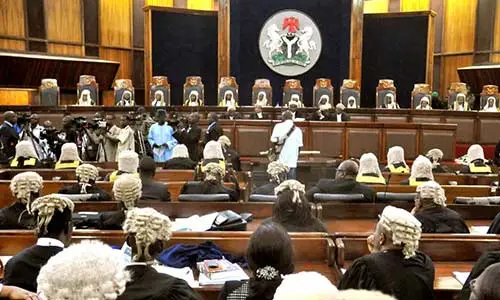COURTROOM NEWS 10/04/2023
Supreme Court Affirms IST Jurisdiction on Capital Market

The Supreme Court has affirmed the jurisdiction of the Investments and Securities Tribunal (IST) over capital market disputes.
In a case spanning 15 years, the apex court has ruled that the IST is the court of first instance for resolution of capital market issues, rather than the Federal High Court (FHC).
In the case- SC/314/2007 – Mufutau Ajaji vs SEC and Others, the Supreme Court has delivered its ruling, affirming the exclusive status of IST as court of first instance for capital market disputes.
The capital market had eagerly awaited the outcome of this case, which remained pending at the apex court for 15 years before it was finally decided in January 2023.
IST is an independent specialised judicial body vested with the responsibility of interpreting the Investment and Securities Act (ISA) 2007 and adjudicating disputes and controversies in capital market transactions.
President Muhammadu Buhari had in 2020 approved the appointment Mr Amos Azi, a lawyer, as the new chairman and chief executive officer of the IST. Until his appointment, Azi was a staff member of the Securities & Exchange Commission (SEC).
Azi’s appointment was for an initial period of five years in accordance with the provisions of Sections 275(2) and 277(1) of the Investments & Securities Act (ISA), 2007. The appointment took effect from July 17, 2020. Buhari had also approved the reappointment of Mr. Nosa Osemwengie, a lawyer, as full time member of the IST, for a second and final term of four years. Osemwengie’s appointment was in accordance with the provisions of Section 277 (2) of the Investments & Securities Act (ISA), 2007. Osemwengie’s appointment took effect from August 1, 2020.
Delivering its judgment in the appeal, the Supreme Court held that the main issue in the appeal was that the Federal High Court declined jurisdiction in the matter, which decision was affirmed by the Court of Appeal.
After reviewing the applicable laws on the actions of the SEC and its Administrative Proceedings Committee (APC), the apex court asked a simple question namely, “Where, then, is the Appellant supposed to go if aggrieved with the decision of the APC?”
This question was answered by the apex court thus: “Based on the foregoing, it implies that any grievance, whether on denial of fair hearing by the APC as in the present case, rule of law, equity, facts or law, etc., should be instituted in the Investment and Securities Tribunal (1ST). It is unequivocal that the proper forum with jurisdiction to hear and determine the case of the Appellant is the Tribunal and not the Federal High Court.”
The case arose from the 2000 privatisation of the then African Petroleum (AP) Plc. In 2000, the National Council on Privatisation (NCP) offered for sale on behalf of the Federal Government 86.4 million ordinary shares of AP. A year later, in April 2001, a core investor of AP alleged at a press conference that the past management of the company had failed to disclose debts of N22.5 billion owed by the company to various creditors. It also alleged that the auditors of AP were negligent in the auditing of the company.
SEC, then, set up a committee to investigate the allegation. The findings of the committee affirmed that N10.18 billion disclosed in the prospectus of AP was less than what the company actually owed as at June 30 1999.
The APC of the SEC indicted one Mufutau Ajayi, an officer of AP that authorised the issue of the prospectus dated March 30, 2000, which contained an untrue statement to wit: that the total indebtedness of the company as at June 30, 1999 was N10.2 billion whereas subsequent revelations indicated otherwise, thereby contravening the provisions of sections 62 (1), (2) (d) and 63 of the ISA 1999.
Ajayi, then, approached the Federal High Court for judicial review of the decision in Suit No. FHC/ABJ/CS/285/2004 – Mufutau Ajayi vs SEC & ANOR. SEC, through its counsel, raised an objection to the jurisdiction of the Federal High Court to hear and determine the case.
The FHC upheld the objection and held that the proper venue for the plaintiff to take the matter to was the IST.
The plaintiff being dissatisfied with the decision of the FHC, appealed to the Court of Appeal in Appeal No. CA/A/200/M/2005 – Mufutau Ajayi vs SEC. The Court of Appeal affirmed the ruling of the FHC in its judgment delivered on May 8, 2007. Ajayi then took the matter further to the Supreme Court by a Notice of Appeal he filed on August 2, 2007.



